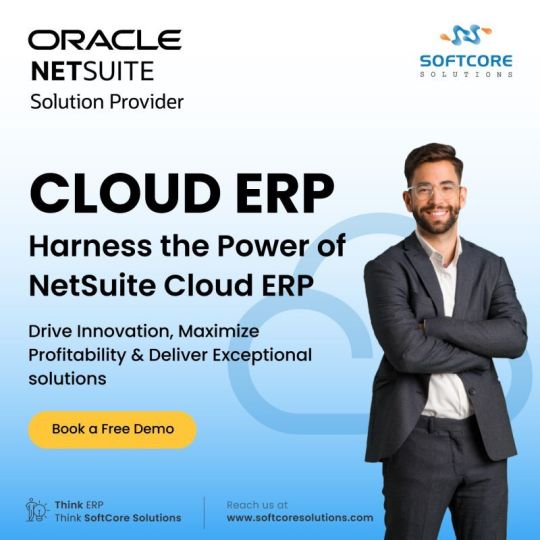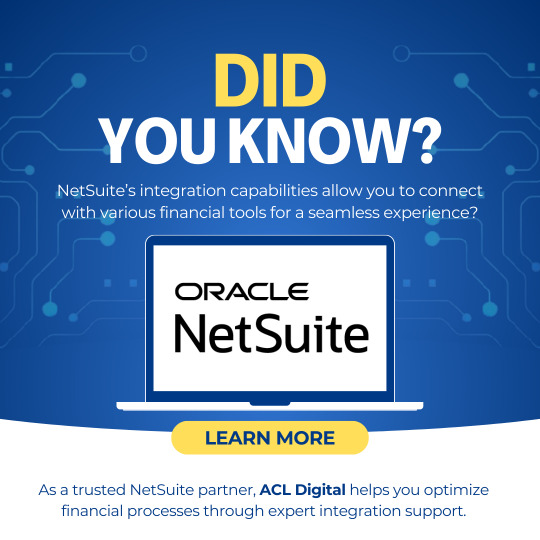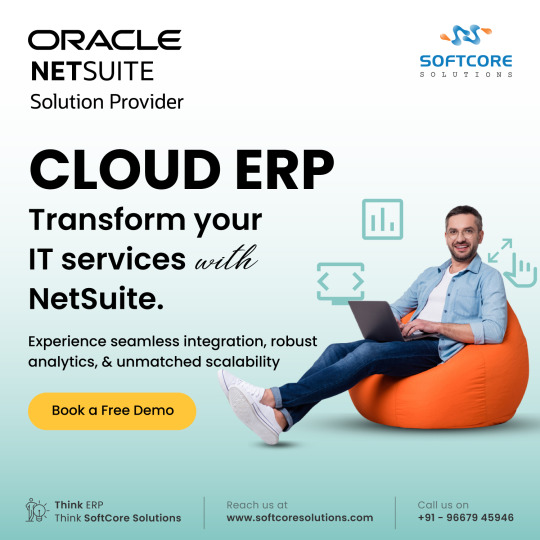#oracle netsuite partners
Explore tagged Tumblr posts
Text
0 notes
Text
Future of Financial Reporting- NetSuite for Real-Time Data Interpretation for FinTech.

India's FinTech revolution appears impossible to stop. The growth of digital payment and lending platforms, in addition to investment Tech firms is insane and yet simple. But, with every step taken, things become more and more complicated. Financial reporting is becoming complicated to manage when the need is speed coupled with accuracy. Obsolete enterprise resource planning systems make businesses operationally slow. Luckily, the Oracle has shifted the way of modern-day business owners. With the use of college ERP, the finer details are taken care of. In addition, manual reconciliations are history. Everything is now automated at ERP software systems level. This guarantees compliance and an Oracle's outweigh around the globe and makes financial deadlines more efficient.
Financial Reports That Are Real Time Allows for Better Decision-making:
Delays in data almost always guarantee unfavorable decisions. Operationally, the business needs to keep up with the time while change is being integrated. In addition, to every finance-controlled area, the cloud ERP systems is the perfect sidekick to every CFO. Cashflow, operations, instant MVMT, and strategy step up for report visibility simultaneously.
Automating Financial Reconciliation & Compliance:
To reconcile manually is to squander precious time. Mistakes make you lose money. Oracle enterprise resource planning helps in automating reconciliation across accounts. FinTech businesses stay ready for audits. Compliance with RBI, SEBI and taxation is made easy with ERP implementation. Every transaction is ensured to be compliant with the law by NetSuite cloud ERP. No more worry about fines and penalties.
AI-Powered Predictive Analytics for Financial Planning:
Financial forecasting is revolutionized by AI. ERP global analytics lets FinTech firms anticipate patterns, adjust their prices, and make future projections. Financial health is guaranteed with the use of AI insights – no more speculation.
Multi-Currency & Cross-Border Transactions Made Easy:
FinTech firms in India have a global presence. Having to deal with different currencies is a problem. Oracle NetSuite ERP allows for currency conversion, tax without the need for user intervention, and external payments. With enterprise resource planning software, completing transactions across borders can be done with a single click. Financial reports become clearer with automatic currency conversion based on the latest rates.
Fraud Detection & Financial Risk Management:
Fraud prevention is critical to almost any business in Fintech. Suspicious activity is monitored and flagged by the AI security tools of Oracle NetSuite. Fraud is a real problem that can now be solved with the help of ERP system solutions. It doesn't need to be a reactionary strategy anymore.
Reports Can Now Be Generated Anytime, anywhere:
Unlike the standard practice of financial reporting that ties companies to office-based infrastructures, Oracle NetSuite Cloud ERP enables work to be done from any location. With cloud ERP, collaboration happens at once. The data is protected, and cloud storage improves the business’s agility.
The asset management reporting comes with a condition of speed, and depth Oracle NetSuite Cloud ERP solutions provides Indian FinTech businesses. In enterprise resource planning software, investments are made with greater security and satisfaction.
NetSuite Cloud ERP has always been a must-have resource for every business looking to stay relevant due to the market's rapid evolution.
SoftCore Solutions proudly has the title of being one of the top Oracle NetSuite partners in India.
A reliable NetSuite partner in India facilitates the smooth ERP implementation, helping FinTech organizations achieve precision, efficiency, and compliance. The next generation of financial reporting systems is already available. Are you geared up to adopt Oracle NetSuite ERP?
FAQs:
In what ways can Oracle NetSuite Cloud ERP help FinTech companies improve financial reporting?
NetSuite automates reconciliations, provides real-time insights, and ensures compliance with financial regulations.
Is it possible to use NetSuite Cloud ERP to manage financial transactions with multiple currencies?
Absolutely! Oracle cloud ERP handles currency exchange, tax compliance, and global transactions automatically.
Can expanding FinTech startups use NetSuite ERP?
Yes! The NetSuite enterprise resource planning solution works seamlessly with FinTech companies as they grow.
For what reasons does NetSuite Cloud ERP enable better fraud detection?
With NetSuite, fraudulent transactions are detected and blocked immediately through its AI-based protection tools.
#netsuite#erpsoftware#netsuite implementation#oracle#netsuite implementation partner#oracle netsuite cloud erp
0 notes
Text

Ready to take your business to new heights? Dive into the world of NetSuite ERP and watch your business growth! Explore our services: https://lnkd.in/gMN-MXE6 Contact: +91 9035705428
#netsuite implementation partner#netsuite crm#netsuite data migration#netsuite customization#erp software#erp#cloud erp#netsuite erp implementation#erpsolutions#datatransformation#digitaltransformation#oracle#cloudcrm
0 notes
Text
https://epiqinfo.com/netsuite-partners-in-india
Top NetSuite Implementation Partner in India
1 note
·
View note
Text
NetSuite customization
NetSuite customization involves tailoring the NetSuite platform to fit the unique needs and requirements of a business. This customization can range from simple changes to complex modifications, and it typically involves leveraging NetSuite's suite of tools and technologies. Here's an overview of the key aspects of NetSuite customization:
SuiteBuilder: SuiteBuilder is NetSuite's suite of tools for customizing the platform's user interface. It allows users to modify forms, fields, lists, records, and workflows without writing any code. With SuiteBuilder, users can add custom fields, create custom record types, customize page layouts, and define custom workflows to automate business processes.
SuiteScript: SuiteScript is NetSuite's JavaScript-based scripting language that allows developers to extend and customize the functionality of NetSuite. With SuiteScript, developers can create custom scripts to automate tasks, customize business logic, and integrate NetSuite with external systems. SuiteScript supports both client-side and server-side scripting, and it provides access to NetSuite's SuiteAPI for interacting with NetSuite data and functionality.
SuiteFlow: SuiteFlow is NetSuite's graphical workflow management tool that allows users to create custom workflows to automate business processes. With SuiteFlow, users can define workflows using a drag-and-drop interface, specifying conditions, actions, and triggers to automate tasks such as approvals, notifications, and data updates.
SuiteTalk: SuiteTalk is NetSuite's SOAP-based web services API that allows developers to integrate NetSuite with external systems and applications. With SuiteTalk, developers can perform operations such as creating, reading, updating, and deleting NetSuite records, as well as executing custom scripts and workflows. SuiteTalk supports a wide range of programming languages and platforms, making it easy to integrate NetSuite with third-party systems.
SuiteCommerce Advanced (SCA): SuiteCommerce Advanced is NetSuite's e-commerce solution that allows businesses to create custom online shopping experiences. With SuiteCommerce Advanced, businesses can customize the look and feel of their online store, as well as integrate with back-office systems such as inventory management, order fulfillment, and customer service.
SuiteCloud Development Framework (SDF): SuiteCloud Development Framework (SDF) is NetSuite's development platform that provides tools and resources for building, deploying, and managing customizations on the NetSuite platform. SDF includes features such as version control, deployment automation, and developer tools for managing customizations across multiple environments.
By leveraging these customization tools and technologies, businesses can tailor the NetSuite platform to meet their specific needs and requirements, thereby maximizing its value and effectiveness for their organization. Let me know if you'd like more information on any specific aspect of NetSuite customization!
No 1 NetSuite solution provider in India
0 notes
Text
Oracle Netsuite POS in India
The oracle NetSuite POS in India enables you to satisfy Omni channel shoppers and build customer loyalty to offer a superior experience and manage comprehensive reports that enable you to make informed decisions, identify trends and optimize your strategy.
#NetSuite for E-commerce Business#NetSuite CRM India#NetSuite ERP Partners#Oracle NetSuite Solution Provider India#NetSuite Payroll India#NetSuite HR Management System India#NetSuite Project Recovery Rescue India#Authorized NetSuite Partner India
0 notes
Text
Core Advantage of Oracle NetSuite
Discover how Hypernix leverages the power of Oracle NetSuite to drive business growth and efficiency. Explore the core advantages and benefits of this dynamic partnership.
1 note
·
View note
Text
The Essential Role of Oracle Analytics Cloud in Modern Data Strategies
Organizations are moving beyond the traditional approach of analyzing historical data to integrating real-time and past data. This shift empowers businesses to drive strategic decisions and achieve boardroom growth mandates across various departments.
The New Paradigm of Data-Driven Decision Making
Organizations now leverage data analytics for multiple purposes:
Marketing: Analyzing customer data to enhance acquisition and retention strategies.
Sales: Utilizing insights for a hyper-personalized approach to advance customers through the sales cycle.
Finance:Identifying opportunities to reduce costs and improve financial efficiency.
Human Resources (HR): Gaining insights into employee engagement and planning effective hiring strategies.
Introducing Oracle Analytics Cloud (OAC)
Oracle Analytics Cloud (OAC) provides a unified and comprehensive platform that enables enterprise stakeholders to seek insights from any data source, across any environment, and on any device. OAC seamlessly integrates into diverse organizational ecosystems, accessing data from both on-premises and cloud sources. It offers powerful, simple, and advanced augmented analytics capabilities.
Key Features of Oracle Analytics Cloud:
OAC strikes a balance between governed, centralized analytics and self-service analytics by offering a single solution that combines Machine Learning (ML) and Artificial Intelligence (AI). This unique blend allows enterprises to harness augmented analytics, self-service analytics, and governed analytics to maximize the collective intelligence of the organization. Some of the standout features include:
Analytic Agility: Fast, fluid self-service discovery, data loading, and blending, ranging from simple to highly sophisticated tasks.
Powerful Data Preparation: Inline data preparation, enrichment, and advanced analytics, along with automated visualizations and data storytelling.
Mobile Accessibility: Instant mobile access with full authoring capabilities.
Recognition and Strengths :
OAC is recognized as a Visionary in Gartner's 2022 Magic Quadrant, highlighting several key strengths:
1. Enterprise Data & Analytics:
With data centers in 30 cloud regions, including specialized regions for the US and UK governments and the US Department of Defense, OAC offers an end-to-end cloud solution encompassing infrastructure, data management, analytics, and analytic applications. Fusion Analytics Warehouse (FAW) provides native integration and closed-loop actions for Oracle ERP, HCM, Supply Chain, and NetSuite products.
2. Augmented Capabilities
Enhanced with integrated graph analytics capabilities, OAC supports subgraphs, shortest path, and page rank analysis, as well as the explainability of ML models. It is the only platform supporting Natural Language Query (NLQ) in 28 languages.
3. Consumer-Focused Product Vision
OAC focuses on developing capabilities that augment both analysts and consumers, offering conversational user experiences and automated data storytelling that generates contextualized audio podcasts.
DataTerrain: Your Expert Partner for OAC Implementation:
DataTerrain's Subject Matter Experts (SMEs) have a proven track record of helping organizations leverage the core features of OAC to drive transformation. Here are some ways we assist our clients:
Self-Service Visualizations: Empowering users to create and share their visualizations effortlessly.
Data Preparation and Enrichment: Utilizing OAC’s in-built support for data preparation and enrichment on the cloud platform.
Advanced Analytics: Offering industry-leading business scenario modeling for self-service, multidimensional, and visual analyses, including descriptive, proactive, and predictive analytics.
Mobile Insights: Delivering contextual insights on the go, with a proactive mobile app that learns individual user routines.
Unified Data View: Providing a consolidated view of data across the organization through a semantic layer that maps complex data with enterprise reporting, governance, and security.
Success Stories with OAC :
Oracle highlights several major success stories from OAC rollouts:
American Multinational Conglomerate : Focused on transportation, e-commerce, and business services.
Fifth-Largest Construction Company : Headquartered in Sweden.
Second-Largest Ride-Sharing Company : Globally recognized.
British Multinational Telecommunications Company : Offering telecom and IT services in 150 countries.
British-American Financial Services Company : Providing risk mitigation products and boutique strategy consulting.
Conclusion :
Oracle Analytics Cloud stands out as a robust platform that meets the diverse needs of modern enterprises. DataTerrain’s expertise in implementing OAC ensures that organizations can fully leverage its capabilities to achieve significant business transformation. Contact us today to learn how we can help your organization harness the power of OAC for unparalleled data insights and analytics.
0 notes
Text
Trends in Oracle NetSuite & Salesforce Alliances: A New Era of Integration
Discover how integration between Oracle NetSuite and Salesforce is transforming businesses. Learn why RAVA Global Solutions, a best Salesforce partner in USA, is leading the way in providing seamless ERP and CRM solutions that drive growth and efficiency.
0 notes
Text

NetSuite is a cloud-based financial management solution that streamlines business operations for companies of all sizes. With its robust suite of features, NetSuite helps businesses manage financials, inventory, orders, billing, and more.
Cinntra is a leading provider of NetSuite implementation and support services, helping businesses optimize their financial management processes and achieve their goals.
Contact us today!
+91-8882709959
#oracle netsuite partners#netsuite erp#netsuite for financial management#erp software#cloud erp solution
0 notes
Text
NetSuite Cloud ERP in India - Empowering IT from Project Management to Billing

Global technology solutions are greatly aided by Indian IT Firms. They do, however, require handling executive systems which have been made efficient to accommodate timely deliveries alongside financials. This is where with their vast array of solutions NetSuite Cloud ERP comes into play. They facilitate the Indian IT firms through management of projects, billing, and other tools which cut the complexities of operations greatly.
For Effortless Deliveries – Project Management:
Every IT company is built around projects and with the help of the NetSuite Cloud ERP, projects have become a walk in the park. Teams are now able to run real-time options for managing their workload on the site which aids them greatly in organization. NetSuite allows for easy access to a central dashboard where all tasks, deadlines, and milestones can be accessed. Irrespective of the client being busy, employees from the firm will be able to deliver on time, meaning happier clients in turn.
Tracking Time and Expenses becomes easy:
Precision whilst tracking time for IT projects remains one of the most important features. NetSuite makes time tracking simple using automated time logs. Doing expenses is as simple as traveling or paying a client, as NetSuite monitors all expenses in record. All parties involved receive updates so that miscommunication is prevented.
Seamless Working with Other Teams:
In the IT sector working together is avoided but should be encouraged. With NetSuite, teams are connected and encourage talking to each other. Project managers, programmers and anyone else working are able to access this information. Fixing bugs or dealing with clients NetSuite will help make sure everyone gets the correct guidance.
Optimizing Resource Availability for IT Departments:
Burnout and missed deadlines are consequences of overworking employees. NetSuite resource optimization solutions address this problem. When these resources are maximized, employees feel more motivated, and teams are more likely to be productive. As project results improve the clients’ needs are better satisfied.
Powerful Analytical and Reporting Functions:
IT functions in a world driven by data, and decisions are made based on facts, and NetSuite enables you to do so with great reporting and analysis tools. NetSuite enables everything from increased client retention to cost reduction thanks to the information it provides.
Combining Technology in Their Relationship Management:
IT businesses require close contact with clients and NetSuite manages to place you right at the forefront with its integrated customer relationship management. Furthermore, the CRM system collaborates with a project management and billing system, which in turn provides an all-around client experience. Happy customers lead to repeat purchases and good recommendations.
Increased efficiency through automation of processes:
Business in the IT sector is made inefficient by the presence of manual procedures. NetSuite accelerates Automation by ensuring that routine tasks such as approvals and reporting are undertaken without any manual input. This improvement in the level of efficiency means your business will be able to outpace the competition.
NetSuite Cloud ERP has indeed continued to be crucial for organizations who want to remain competitive in such a fast-paced environment. SoftCore Solutions proudly holds the distinction of being one of the best Oracle NetSuite Cloud ERP partners in India.
Ready to improve your organizational structure? Adopt the Netsuite Cloud ERP system and change the way work is done.
FAQs:
1. How does NetSuite assist IT firms with project management?
Planning, tracking and execution is a usually cumbersome task, but NetSuite helps tame that by providing integrated dashboards and resource allocation tools.
2. Is NetSuite effective for the growth of IT businesses?
I can say undoubtedly yes. NetSuite scaling is not a problem, and it keeps up with the growth and expansion of the business.
3. In what ways does NetSuite help improve financial management?
NetSuite offers timely and accurate money related information, precise budget allocation, and compliance processes in real time.
4. Is CRM in Syklus6 integrated with other processes?
Yes, NetSuite's CRM facilitates project management, billing, and many more processes.
#netsuite#erpsoftware#oracle#netsuite implementation partner#oracle netsuite cloud erp#netsuite implementation
0 notes
Text
#business#erp software#crm#cloudcomputing#cloud erp#netsuite implementation partner#netsuite data migration#netsuite customization#netsuite crm#oracle#ai
1 note
·
View note
Text
Best NetSuite Solutions and Services Provider | Suite Works Tech

Suite Works Tech is the leading NetSuite solutions provider, specializing in advanced services like subscription billing, rental management, and field service and maintenance management. As a trusted Oracle NetSuite partner, we deliver top-tier solutions, including the best subscription billing software for NetSuite, leading rental management software, and innovative field service management tools. Empower your business with top-rated NetSuite solutions for efficiency and growth.
#Best NetSuite Solutions and Services Provider#Leading NetSuite Solutions and Services Provider#Top NetSuite Solutions and Services Provider#Best Oracle NetSuite Solutions Provider#Leading Subscription Billing Software for NetSuite#Best Subscription Billing Software for NetSuite#Top Subscription Billing Software for NetSuite#Leading Rental Management Software for NetSuite#Best Rental Management Software for NetSuite#Top Rental Management Software for NetSuite#Field Service and Maintenance Management Software for NetSuite#Best Field Service and Maintenance Management Software for NetSuite
0 notes
Text
NetSuite Implementation
Introduction: In today's fast-paced business landscape, companies are constantly seeking ways to enhance efficiency, streamline operations, and gain a competitive edge. Enter NetSuite, a cloud-based enterprise resource planning (ERP) system that offers a comprehensive suite of applications to manage various aspects of a business, from financials and customer relationship management (CRM) to e-commerce and beyond. Implementing NetSuite can be a game-changer for organizations, but it requires careful planning and execution. This article serves as a comprehensive guide to navigate the NetSuite implementation process successfully.
1. Understanding Business Needs: Before diving into NetSuite implementation, it's crucial to assess your organization's unique requirements and objectives. Conduct a thorough analysis of current processes, pain points, and areas for improvement. Engage stakeholders from different departments to gather insights and ensure alignment with business goals. This step lays the foundation for a tailored NetSuite solution that addresses specific needs and delivers maximum value.
2. Selecting the Right NetSuite Partner: Choosing the right implementation partner is paramount to the success of your NetSuite project. Look for certified NetSuite solution providers with a proven track record of successful implementations across industries. Evaluate their expertise, industry experience, and client testimonials to gauge their suitability. Collaborating with a reputable partner ensures access to expert guidance, best practices, and ongoing support throughout the implementation journey.
3. Planning and Preparation: Effective planning is key to a smooth NetSuite implementation. Develop a comprehensive project plan outlining key milestones, timelines, resource allocation, and dependencies. Define roles and responsibilities for internal teams and external vendors, fostering clear communication and accountability. Conduct data cleansing and migration activities to ensure accuracy and integrity within the NetSuite system. Establish training programs to familiarize users with the new platform and facilitate adoption.
4. Configuration and Customization: NetSuite offers extensive customization capabilities to tailor the system to your organization's unique requirements. Work closely with your implementation partner to configure workflows, dashboards, and reports that align with specific business processes. Leverage SuiteBuilder and SuiteFlow tools to customize fields, forms, and workflows without extensive coding. Implement integrations with third-party applications to seamlessly connect disparate systems and streamline data flow.
5. Testing and Quality Assurance: Thorough testing is essential to validate the functionality, usability, and performance of the NetSuite implementation. Conduct comprehensive testing across different modules, scenarios, and user roles to identify any issues or discrepancies. Utilize sandbox environments to simulate real-world scenarios and mitigate risks before deploying changes to the production environment. Engage end-users in user acceptance testing (UAT) to gather feedback and ensure alignment with expectations.
6. Deployment and Go-Live: With thorough planning and testing complete, it's time to deploy the NetSuite solution and go live. Coordinate closely with internal teams and external stakeholders to execute the deployment plan effectively. Provide adequate support and training resources to assist users during the transition period. Monitor system performance and address any issues promptly to minimize disruptions to business operations. Celebrate the successful launch of NetSuite and acknowledge the collective effort of everyone involved.
7. Ongoing Support and Optimization: NetSuite implementation doesn't end with the go-live phase; it's an ongoing journey of continuous improvement. Establish channels for feedback and support to address user inquiries, enhancement requests, and technical issues post-implementation. Leverage NetSuite's regular updates and releases to stay abreast of new features and functionalities. Continuously evaluate system performance, user adoption, and business outcomes to identify opportunities for optimization and refinement.
Conclusion: NetSuite implementation is a strategic investment that empowers organizations to streamline operations, drive growth, and stay competitive in today's dynamic business environment. By following the comprehensive guide outlined in this article, businesses can navigate the implementation process effectively and unlock the full potential of NetSuite to achieve their goals. With the right planning, partnership, and commitment to continuous improvement, success with NetSuite is within reach.www.jobinandjismi.com
#netsuite implementation partner#netsuite solution provider partner#netsuite customization#cloud erp#oracle netsuite
1 note
·
View note
Text
Navigating the Complexities of NetSuite Implementation: Overcoming ERP Challenges
Implementing a robust ERP system like Oracle NetSuite can be transformative for businesses seeking smooth operations and improved efficiency. However, the journey to a successful NetSuite implementation is often riddled with challenges that require strategic planning and expert execution. The blog "8 Key Challenges in NetSuite Implementation: What to Anticipate" by Entartes dives deep into these hurdles, providing insights to help organizations prepare and navigate their way effectively.
Here’s an overview of the essential points from the blog, highlighting common ERP implementation challenges and how businesses can anticipate and address them.
Understanding the Core Challenges
Inadequate Planning and Requirement Gathering One of the primary challenges in Oracle NetSuite implementation is the lack of a clear roadmap. Businesses often underestimate the importance of detailed requirement analysis, leading to gaps between what is implemented and what is actually needed. Without proper planning, organizations risk misalignment between the ERP system and their operational goals.
Data Migration Complexities Migrating existing data into NetSuite is another significant hurdle. Businesses face issues with data quality, formatting, and compatibility, which can delay implementation timelines. Ensuring data accuracy and integrity is crucial to prevent operational disruptions.
Customization vs. Standardization NetSuite is highly customizable, but excessive customization can make the system complex and harder to manage. Balancing the need for tailored functionalities with standard practices is a common ERP implementation challenge.
Change Management and User Adoption Introducing a new ERP system like NetSuite often meets resistance from employees who are accustomed to existing processes. Proper training and a change management strategy are critical to ensure smooth adoption across all departments.
Integration with Existing Systems Integrating NetSuite with other legacy systems is a technical challenge that demands expertise. Businesses need to ensure smooth communication between systems to avoid operational silos.
Budget Overruns ERP implementations, including NetSuite, can exceed initial budget estimates due to unforeseen complexities or lack of precise scope definition. Having a realistic budget and contingency plans is essential.
Vendor Selection and Collaboration Choosing the right implementation partner can make or break the project. Working with an experienced vendor like Entartes ensures access to proven methodologies and industry expertise, minimizing risks and delays.
Post-Implementation Support The journey doesn’t end with implementation. Continuous support and optimization are essential to maximize the benefits of NetSuite. Lack of post-implementation support can lead to inefficiencies and missed opportunities for improvement.
Strategies to Overcome Challenges
To address these challenges effectively, businesses should:
Invest in Planning: Allocate sufficient time and resources to requirement gathering and project scoping.
Ensure Data Readiness: Conduct thorough data cleansing and validation before migration.
Prioritize Training: Provide comprehensive training to employees to enhance user adoption.
Collaborate with Experts: Partner with experienced vendors like Entartes to leverage their expertise in NetSuite implementation and industry best practices.
Adopt Agile Methodologies: Break the project into manageable phases for better control and flexibility.
Why Choose Entartes for NetSuite Implementation Entartes stands out as a trusted partner for businesses embarking on their Oracle NetSuite implementation journey. Their team of experts ensures a smooth transition, addressing specific business needs while mitigating risks. With their proven track record and client-focused approach, Entartes helps organizations unlock the full potential of NetSuite.
Final Thoughts ERP systems like Oracle NetSuite are indispensable for modern businesses, but the road to successful implementation is not without its challenges. By understanding and preparing for the common ERP implementation challenges, organizations can position themselves for success. Whether it’s planning, integration, or user adoption, having the right strategies and partners makes all the difference.
#netsuite implementation#netsuites software#erp implementation challenges#netsuite implementation guide#oracle netsuite implementation#erp implementation issues#netsuite implementations#erp implementation issues and challenges
0 notes